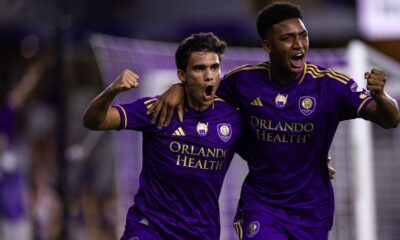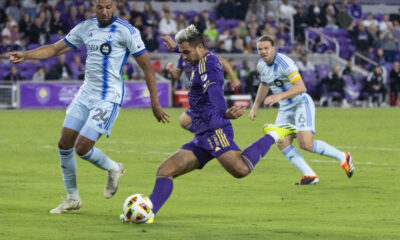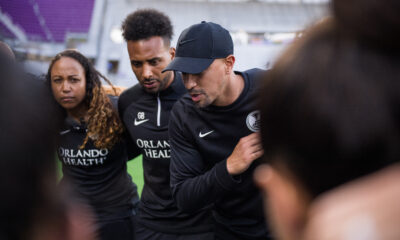Orlando City
Orlando City Center Back Antonio Carlos Transfers to Fluminense FC
The veteran center back is on his way home to Rio de Janeiro after four standout seasons in purple.

The winds of change continue to sweep through the Orlando City roster this off-season. After parting ways with captain Mauricio Pereyra and declining the option on midfielder Junior Urso, the Lions parted with another veteran player today by transferring center back Antonio Carlos to Fluminense FC in Brazil’s Serie A. The Rio de Janeiro native returns home to play for his hometown club after serving four seasons with Orlando City. Details of the transfer were not disclosed.
“Antonio brought passion and fight every day, whether it was a cup final or day of training and helped build our team into one of the most difficult to play against,” Orlando City Executive Vice President and General Manager Luiz Muzzi said in a club press release. “We’ll miss his energy and intensity, and thank him for everything that he has given to our club and its fans. On behalf of the entire organization, we want to thank Antonio for his commitment to the club and wish him the best of luck in this next opportunity.”
The announcement comes just 15 days shy of the four-year anniversary of Orlando City officially announcing on Dec. 30, 2019 that Carlos was signed on a one-year loan from Palmeiras with a club option to buy. Just under a year later, on Dec. 1, 2020, Orlando City announced that it had secured Carlos on a permanent transfer and signed him through the 2023 season with a club option for 2024. The Lions exercised that option following the 2023 season but announced at that time that the club was in negotiations to transfer the center back.
So, today’s news wasn’t unexpected but it is a bit sad for fans of the club, who have seen Carlos pair with Robin Jansson on the Lions’ back line since the 2020 season, when he replaced departing starter Lamine Sane next to the Swede.
Carlos played in 88 MLS regular-season games with Orlando City (80 starts) and logged 7,082 minutes. He scored four goals in his MLS career and added four assists, attempting 51 shots and getting 14 on target. He passed at an 86% rate with eight key passes. Defensively, Carlos closes his Orlando City career with 148 interceptions in MLS play, a 61.5% success rate in duels and a 53.2% headed duel rate, helping the Lions keep 21 clean sheets. He committed 80 fouls, suffered 52, was booked 20 times and was sent off once.
The Brazilian played in seven career playoff matches, starting four, and amassed 449 minutes played in the postseason. He did not score a goal or assist on one, firing four shots but putting none of them on target. He was an 80.4% passer in the playoffs without a key pass. Defensively, he posted 19 interceptions, a 57.7% successful duel rate and a headed duel rate of 46.3%. He committed five postseason fouls, drew five on the opposition, and earned three bookings, all of which were yellow cards.
Carlos helped Orlando City win the 2022 U.S. Open Cup and was a clutch performer during his career in purple. In four shootouts across all competitions, the Brazilian defender showed a deft touch and killer instinct from the penalty spot, converting all four of his spot kick opportunities.
The Mane Land staff recently awarded Carlos a season rating of 7 out of 10 for his 2023 season, after awarding him a 7 last year, a career-high 8 for 2021, and a 7.5 for 2020. He started the 2022 season on absolute fire, looking like an MLS Best XI center back and potentially a league defender of the year favorite until being injured in a loss against LAFC. He didn’t quite reach that same level of form after his return, and his last two seasons have seen the 30-year-old’s number of games and minutes decrease due to injuries, so perhaps the writing was on the wall when he was not able to wrestle the starting job back from Rodrigo Schlegel at the end of the 2023 MLS campaign.
What It Means for Orlando City
Since his arrival, and when healthy, Antonio Carlos has been Orlando City’s most dynamic center back since the club joined Major League Soccer. He’s tall, athletic, can jump out of the stadium, and understands the game well. He doesn’t take a lot of risks, but is capable of starting an attack from the back with a well-timed long ball or through pass and he generally does enough to put the league’s top strikers off a bit, even when they’re in good position. As with just about any MLS defender, he had moments where he would get caught on occasion, but he’s been as solid as they come for the most part. Carlos and Jansson have combined to serve as Orlando City’s best center back pairing ever and one of the league’s best tandems over the last several years. They are a large part of why the Lions have been to the playoffs four straight seasons.
Simply put, the Lions must find a suitable replacement for Carlos and, if possible, an upgrade. MLS, especially the Eastern Conference, keeps improving and drawing more and more dangerous attacking talent to these shores. Improving the back line to deal with that is important.
Although Schlegel played well down the stretch in 2023 and has earned the right to compete for the starting spot opposite Jansson, it seems he’ll always be a high-risk, high-reward player. Against Columbus in the Eastern Conference semifinals, we saw the high-risk part of Schlegel’s game bite Orlando City, as an unnecessary early yellow card turned into a sending off later, when the Argentine felt he had no choice but to commit a tactical foul on Diego Rossi. Schlegel is also more prone to defensive lapses than Carlos has been over the years. That part may improve with more experience and more starts, but the league has gotten too good to rely on “may.”
I would expect Orlando City to be on the lookout for a starting caliber center back to add to the roster, using either Targeted Allocation Money or potentially a Designated Player slot if the club can find someone worthy of that kind of commitment. Carlos’ departure clears some room, as he earned a base salary of $900,000 in 2023.
Orlando City
Orlando City’s 2024 Offensive Blueprint (So Far)
An evaluation of how Orlando City has been trying to score goals in 2024.
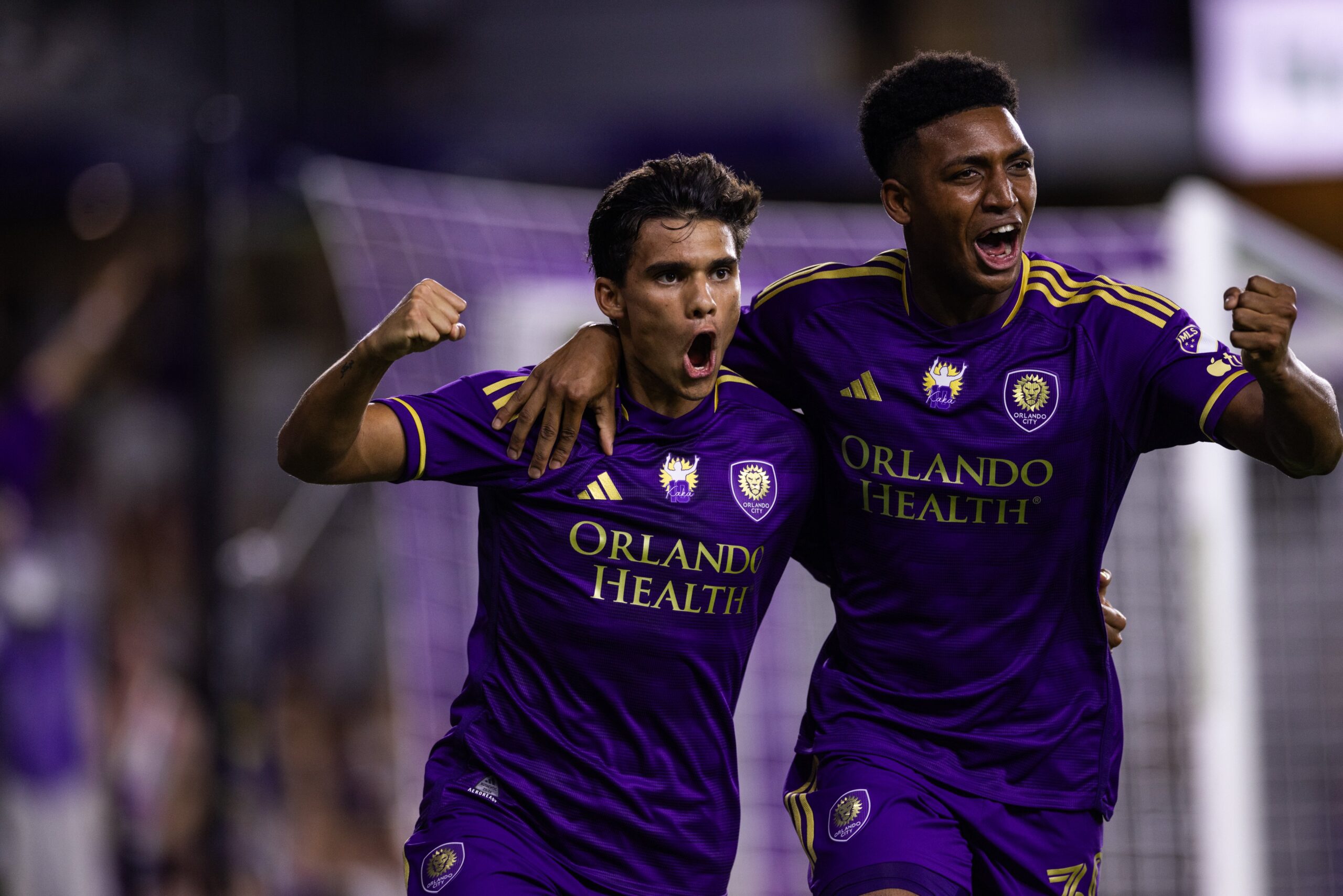
Jay-Z released one of my all-time favorite albums, The Blueprint, in 2001. With apologies to him, and his track on that album called “Girls, Girls, Girls,” what we as fans want are goals, goals, goals, and we want our team to score as many of them as possible. In this article I will explore Orlando City’s attacking style — some might say their attacking…blueprint — thus far this season and evaluate how the Lions have been trying create those goals we do adore.
All right, now that we have pushed the limit on puns and wordplay about that album, let’s look at some numbers related to Orlando City’s offense. First, let’s start with the direction of play, because Orlando City has a very clear plan of attack in 2024, and it involves the left side. According to the tracking from whoscored.com, Orlando City attacks down the left side on nearly half of its possessions.
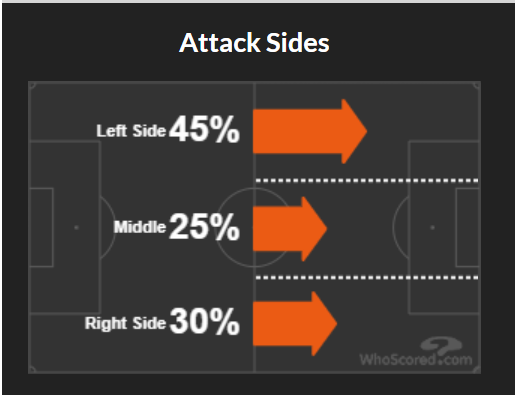
No team in MLS favors one side of the field as frequently as Orlando City’s 45% on the left side, and it is interesting that it is so high down the left because Facundo Torres, generally regarded as the squad’s most creative and dangerous player, plays most frequently on the right side of the field. I think there are three primary reasons for the left side favoritism:
- Iván Angulo is one of the fastest players in MLS and spends most of his time on the left side of the field, so the team tries to get him into space so he can use that speed to get the defense on its heels.
- Orlando City has three left-footed players who love a cross so much I am surprised they play for Orlando City and not Vatican City. Rafael Santos averages 5.1 crosses per 90 mins (27th in MLS), Nico Lodeiro averages 5.6 (16th), and Martín Ojeda averages 9.61 (second). Ojeda has been playing more centrally recently, but he still drifts to the left frequently. Lodeiro does the same, and Santos nearly exclusively stays on the left side. All three of them are crossing machines.
- Torres loves to cut back into the middle from his normal slot on the right side of the field, and so crossing it from left to right gives him space to operate, as the defense has to recover on a switch of field, and a scrambling defense against a talented attacking player is advantageous for Orlando City. Torres is fifth in MLS in receiving passes from 10+ yards away in the offensive area of the field, and his per-90-minute average for those receptions has increased from 2022 (8.4) to 2023 (9.8) to 2024 (11.4). Additionally, here is Facu’s shot chart for the year, courtesy of fotmob.com, and you can see that of his seven non-penalty-kick goals, all of them come from the right half of the field (his most recent goal against New England is highlighted with the red circle, because after a few minutes I gave up on trying to figure out how to show this without having one highlighted):
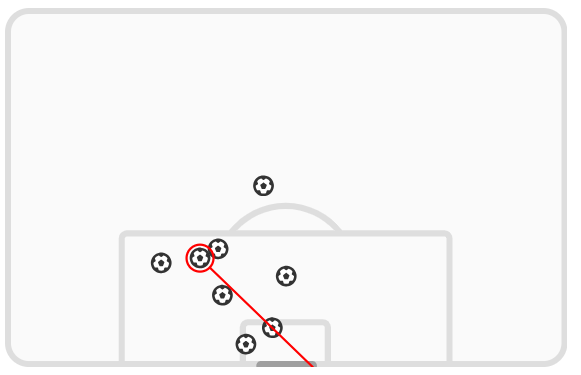
Expanding a little bit off of the direction of play, but returning to the second item in the list above, Orlando City leads all of MLS with an average of 21.32 crosses per 90 minutes. The other 28 MLS teams average 16.6 crosses per 90 minutes, so Orlando City is crossing the ball 28% more frequently than the average MLS team. The Lions have a physical presence in Duncan McGuire in the middle, so this makes sense to target him with crosses into the 18, and in fact the team is fourth in MLS this season with an average of 2.4 completed crosses into the penalty areas per 90 minutes.
It is not just Duncan though, of the 36 goals Orlando City players have scored this season (the other three are own goals), nine of them have come on a header and by eight different players. That 25% of goals scored on a header is the highest percentage for any Orlando City team in fbref.com’s tracking (goes back to 2018) and ranks the team only behind Austin FC’s 29% in MLS this season.
All crosses do not necessarily end in headers, but nearly all headers come from crosses, and the irony of the fact that Orlando City is scoring a high percentage of its goals from headers is that the Lions rank, to use a technical term, DFL in the league in percentage of aerial balls won (40.1%, and the next lowest is 45.4%). It’s kind of like the tagline to those Most Interesting Man in the World beer commercials from Dos Equis — the Lions don’t often win aerial balls, but when they do, they score goals.
Flipping from balls in the air to balls that are generally played on the ground, according to the data tracked by Opta on fbref.com, Orlando City is seventh in MLS in completed through balls per 90 minutes with an average of 1.5. The Lions have been in the top third of MLS in four of the last five seasons in this statistic, as this is clearly a staple of an Óscar Pareja-coached squad.
If you look at the individual MLS players who are leading the league in completing these dangerous balls, it is a veritable who’s who of creative players across the league. Say what you will about Luis Muriel, and I wrote a whole article about him a few weeks ago, but his passing ability is excellent, and it did not surprise me at all to see him high on this list and among the other well-known names. Here are the top 15, which also includes Lodeiro, among players who have played at least 500 minutes:
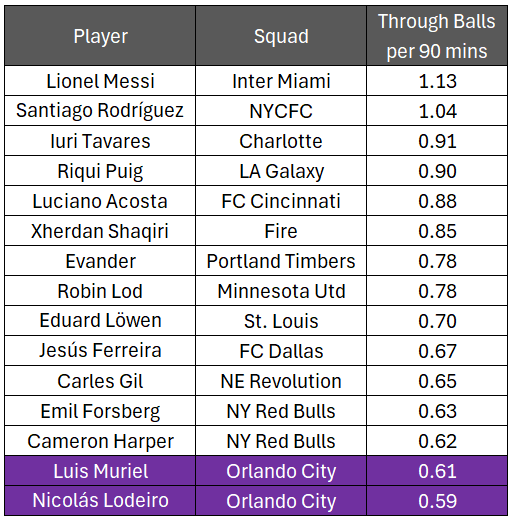
I touched on the left side focus earlier and how Angulo’s speed plays a large role in why the team plays more frequently down the left side, and that comes into play here as well with Orlando City’s predilection for playing through balls. It is also now time for Dagur Dan Thórhallsson to enter the chat, because he is just as much of a through ball target as Ruan was for several years in making speed runs up the right side of the field, and he ranks 24th among defenders in goal-creating actions per 90 minutes (0.24). Coincidentally, he also ranks 24th in shot-creating actions per 90 minutes (2.0). McGuire is also a target for these through balls as he makes excellent shallow runs behind defenders to then run onto balls played in front of him, and Ramiro Enrique is also pacey enough to do the same.
The completed crosses and through balls, as well as the fact that Orlando City is in the top 10 in total completed passes per 90 minutes, contribute to the team leading MLS with 10.1 completed passes into the penalty area per 90 minutes. The rest of MLS averages only 8.4, so Orlando City’s offensive tactics puts the team 20% higher than the rest of the league in terms of its frequency of completing passes to teammates inside the box.
Now, what teams want are goals, not completed passes into the penalty area, but you can see what the Lions are trying to do offensively by looking what these numbers reveal about how they are directing their attacking play.
Orlando City has a burner on the left (Angulo) and also several left-footed players who have the ability to whip in a dangerous cross (Ojeda, Lodeiro, Santos), so the focus is more on going down the left than the middle or the right. The Lions do have a fullback (Thórhallsson) with pace on the right too, so he is a target when they go right, and as a former midfielder, he has the ability to create offense coming forward, so he does with great frequency. The best finisher (Torres) is out on the right but loves to cut back to his left, and this year there is a higher focus on getting him the ball in space as opposed to having him leading the buildup.
Three players (Ojeda, Lodeiro, Muriel) are sharing the 10 role and releasing through balls to the outside and inside threats, and McGuire and Enrique are essentially serving as soccer versions of a basketball rim runner, attacking the goalmouth and trying to score in any way possible.
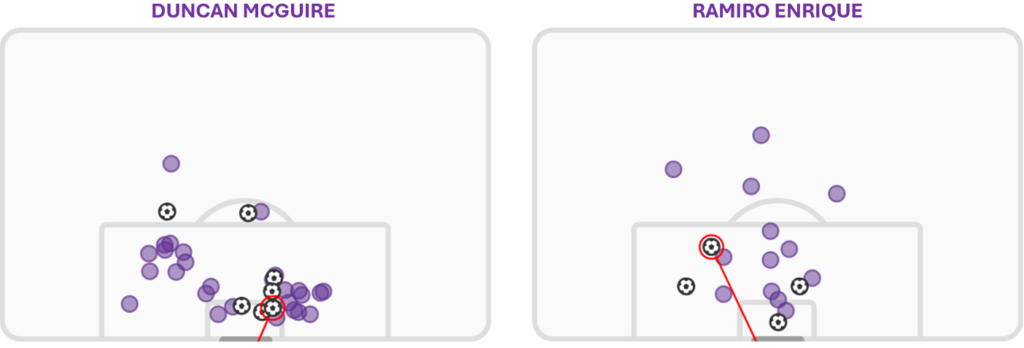
It all sounds great on paper, but for much of the season the offense was sputtering — so much so that Orlando City has scored more goals in the last seven games (20, 2.9 goals per game) than it did in its first 18 games (19, 1.1 goals per game). The first half of the season contained several issues that I believe contributed heavily to the low goal-scoring output, with several injuries, games missed for international duty, and competing in Concacaf Champions Cup at the same time as the start of the regular season, forcing squad rotation and players playing outside of their normal positions.
There was also just some poor play during those early months as well, some self-inflicted poor performances. I believe that Orlando City has found something though in the last few weeks, and while the Lions may not score 2.9 goals per game for the rest of the season, I think that what we have seen recently is a settled team of players who know their roles and understand the strategy, and who have the ability to execute that strategy.
Just 17 years after it was released, Jay-Z’s The Blueprint was selected by the Library of Congress for preservation in the United States National Recording Registry for being “culturally, historically, or aesthetically significant.” Let’s hope that 17 years from now, in 2041, we are all looking back fondly on what became an athletically significant 2024 season for Orlando City.
Orlando City
Orlando City vs. CF Montreal: Three Keys to Victory
What do the Lions need to do to get a victory to start the Leagues Cup?
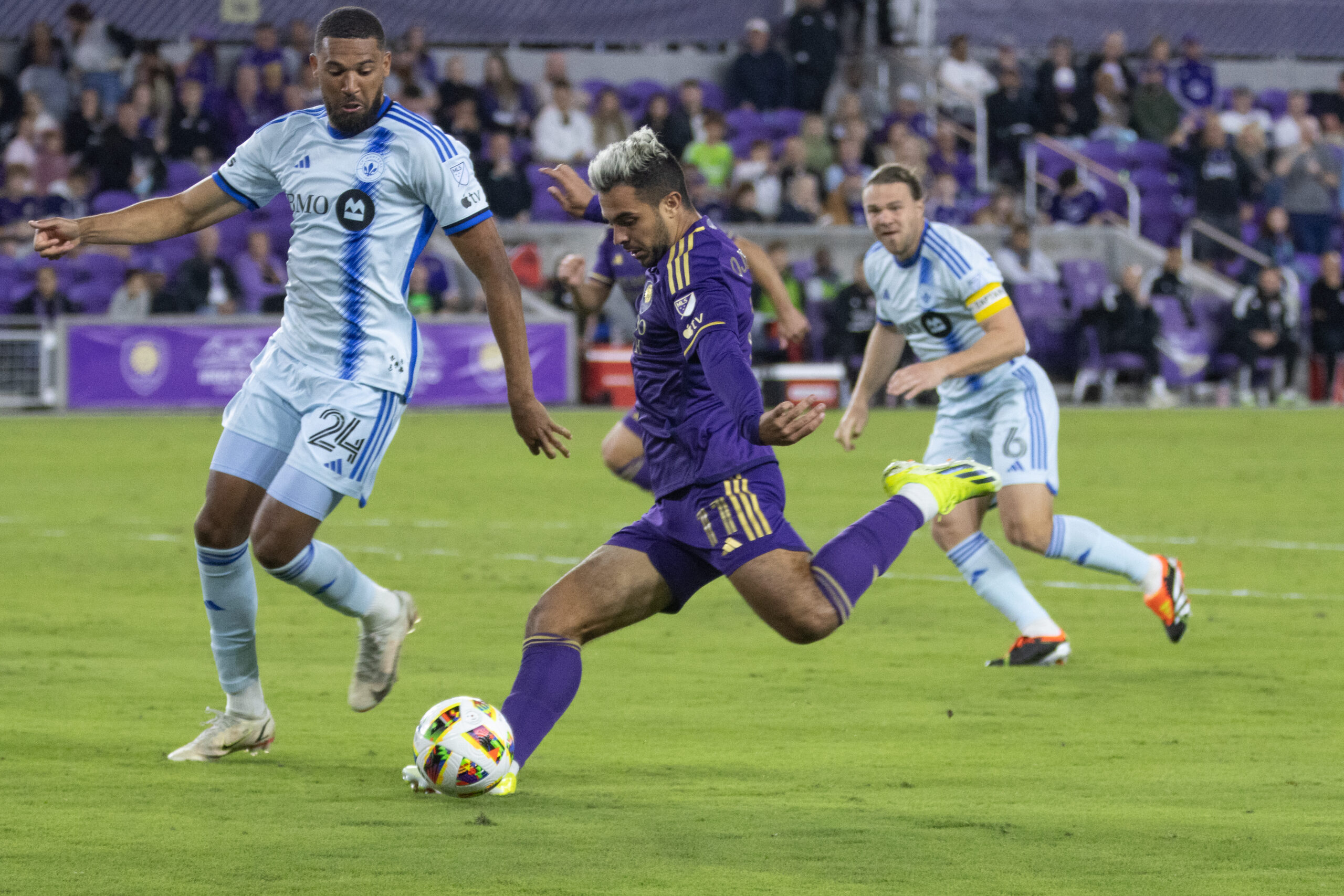
Orlando City plays CF Montreal in its first 2024 Leagues Cup match Friday night at Inter&Co Stadium. The Lions have been on a nice five-match undefeated streak during the regular season. Oscar Pareja loves tournament play and will certainly do everything he can to win this first match.
What does Orlando City need to do to defeat CF Montreal in the Don Garber Loves Money Cup…er, the Leagues Cup?
Stop the Canucks
Montreal has scored 34 goals in the regular season. However, only four of those goals came in the last five matches. Still, Orlando City seems to have trouble with this Montreal squad no matter where the match is played. As such, I want to see the defense that shut down D.C. United and Nashville SC, not the one that allowed multiple goals against the Chicago Fire.
That means Pareja needs to get the left back position sorted. I know he wants the Rafael Santos of 2023 to show up in 2024. So far, Santos has not found the good form from a year ago. Kyle Smith has been mostly good when he’s gotten time on the left, but he’s not the first choice.
There’s also the matter of David Brekalo. I think that Pareja kept rolling with Rodrigo Schlegel because the Lions went on a run as Brekalo was on international duty. Now, he can re-insert Brekalo in the starting spot since it won’t affect the MLS standings. Whether he does or not is the real question.
Smart Rotation
I mentioned the potential options on the back line, but there are other players who could use a rest, could recover from a knock, or need some additional playing time. Of course, Pareja tends to stick with what is working, so I’m not sure how much rotation we will see to start the match. He can, however, change up how he uses his substitutes.
If Pareja decides to sit Facundo Torres to allow him to be fully healthy, he still has Martin Ojeda playing well. Jeorgio Kocevski has been effective in his limited minutes, making him a good candidate to see some more time, even if he doesn’t start. Competitions like Leagues Cup can allow the team to heal up or rest up before the regular season starts back up.
Revive the Attack
Ramiro Enrique is on a scoring streak. I’m glad he is since Duncan McGuire is with the U.S. Olympic team, but Orlando City needs more. I think the Leagues Cup is a good opportunity to try anything and everything to get Luis Muriel better integrated into the Orlando City attack. He has the talent, but something hasn’t quite clicked yet.
This is also an opportunity for others to contribute some goals. It’s been a bit since Nico Lodeiro scored one. Ojeda could use a banger to get going again, and don’t forget Jack Lynn. Montreal has given up 49 goals in the regular season and has a -15 goal differential. The Lions need to take advantage of such a defense to spark some offensive production.
That is what I will be looking for Friday night. Let me know your thoughts in the comments below. Vamos Orlando!
Lion Links
Lion Links: 7/25/24
Marta’s legacy, Orlando Pride get ready for Monterrey, U.S. men lose to France in Olympic soccer, and more.
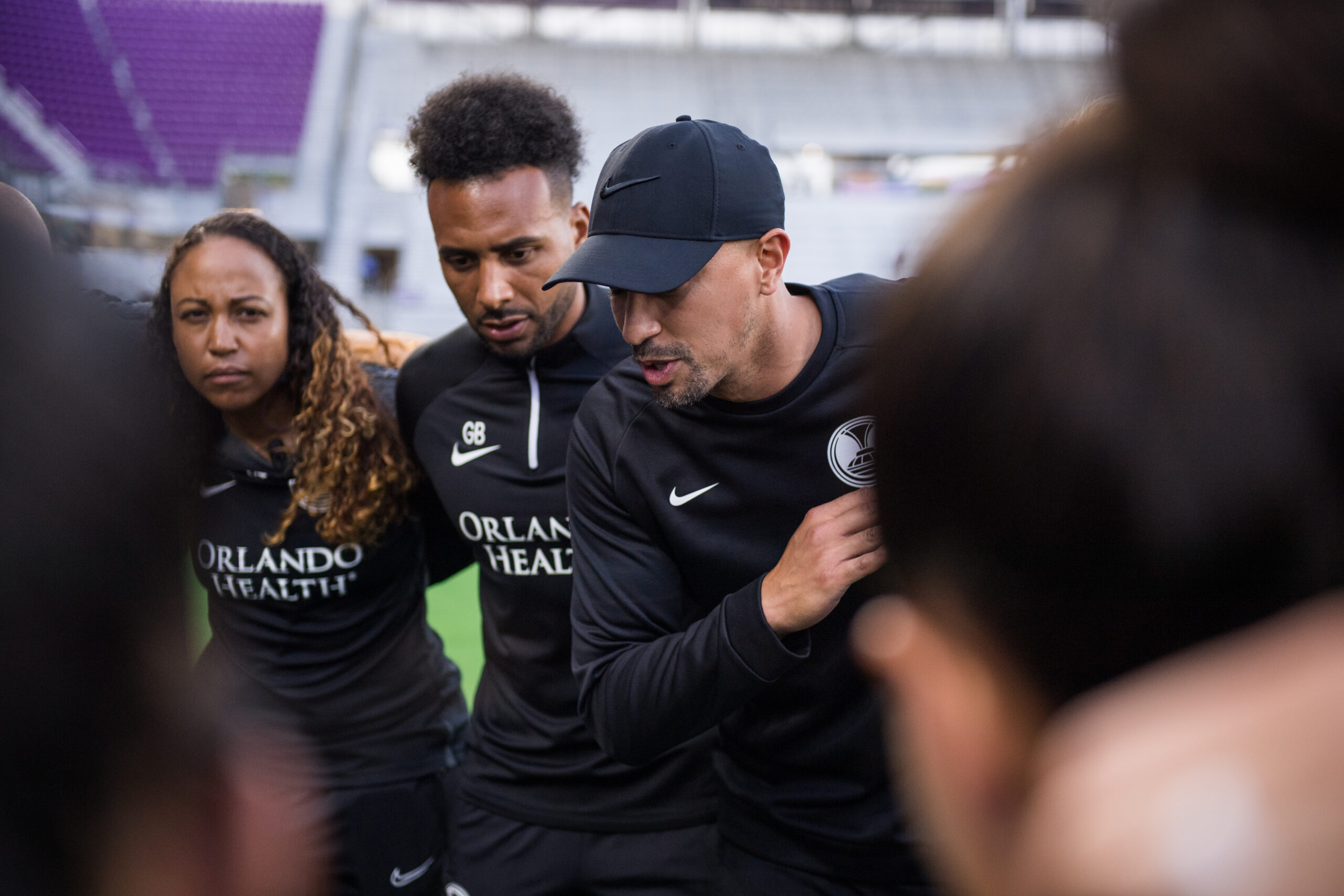
How’s it going, Mane Landers? I’m settling back into the swing of things after a weekend trip to Maine that featured so many lobster rolls that I’m pretty sure my veins have more butter than blood in them at this point. All of the soccer going on takes some of the sting out of returning to work at least. Let’s dive into today’s links!
Marta’s Journey to Paris
Orlando Pride and Brazilian star Marta will begin her final international tournament today when Brazil takes on Nigeria this afternoon. Through interviews with the coaches, teammates, and opponents she’s had over the course of her career, ESPN detailed the impact she’s had on soccer. It’s a great feature that I strongly suggest you read in full, as it also touches on the instability of women’s soccer at the club level that she and many others had to battle against. From her teenage years in Brazil to becoming an outspoken ambassador for the sport, there are plenty of great vignettes into her life as a player included as well.
Orlando Pride Prepare for Monterrey
After losing a penalty shootout to the North Carolina Courage in their NWSL x Liga MX Femenil Summer Cup opener, the Orlando Pride will aim to right the ship when they take on Monterrey on Saturday. It’s been over a month since the Pride have played at home, which should give the team a boost while notable players are at the Olympics. None of the Liga MX teams beat an NWSL team in the first round of matches, and Monterrey lost 3-1 to Racing Louisville. Pride Head Coach Seb Hines spoke on how he’s excited to see how the team matches up against a team from outside the NWSL, along with how it will be a good experience for the players.
Checking In With Dennis Chin
As part of the recurring series to put a spotlight on those who have played a part in Orlando City’s history, former Lion Dennis Chin spoke on his time in Orlando during the team’s USL days. It’s been 10 years since Chin played in Orlando, where he scored 32 goals across 103 appearances and won the 2012 USL Pro Golden Boot. His family came to Orlando from Jamaica when he was young, and playing for the club gave him a chance to represent the City Beautiful.
“I felt like an extension of what everyone wanted to be,” he explained. “I felt like I was representing not just myself, but the whole city, my family and everyone. To still have that connection and to still feel that love, it just means the world to me.”
Chin tried his hand at coaching after retirement but stated he didn’t enjoy it, instead choosing to start his own player agency. He’s made strides providing player representation since then, using the lessons he learned from his own career to support players.
U.S. Olympic Men’s Team Loses to France
The United States Men’s Olympic Soccer Team had a rough first game in Paris after losing 3-0 to France. After a scoreless first half, Alexandre Lacazette gave France the lead in the 61st minute and Michael Olise scored another soon after. Orlando City forward Duncan McGuire started up top for the U.S. and was subbed off in the 86th minute, right after Loic Bade scored France’s third goal. The next match for the U.S. will be on Saturday against a New Zealand side that won 2-1 against Guinea. The Yanks will need to be sharper in that match and the group stage finale against Guinea on Tuesday if they want to advance.
MLS All-Stars Fall to Liga MX All-Stars
It was a rough night for the MLS All-Stars, who lost 4-1 to the Liga MX All-Stars in Columbus. Monterrey striker German Berterame got the scoring started in the 16th minute, but Columbus Crew duo Diego Rossi and Cucho Hernandez linked up for an equalizer a minute later. The Liga MX All-Stars scored again before halftime and then put the game to bed with a pair of back-to-back goals in the second half. The MLS All-Stars had their chances to score but lacked a finishing touch and weren’t able to claw their way back into the match. Attention now turns to the Leagues Cup, which kicks off on Friday and will pit MLS and Liga MX teams against each other.
Free Kicks
- Former Pride player Ali Riley won’t be taking the field for New Zealand during the Olympics due to a nerve injury. It’s unfortunate news and hopefully she has a smooth recovery from here on out.
- French winger Delphine Cascarino will join the San Diego Wave after the Olympics, signing a contract through the 2026 season. The 27-year-old has been with Lyon since making her professional debut in 2015.
- An assistant coach and analyst for Canada were both removed from the team and sent home after New Zealand reported Canada for disrupting its Olympic training with a drone. Head Coach Bev Priestman withdrew herself from coaching the match as well.
- The Olympic match between Argentina and Morocco had to be suspended for two hours due to fans rushing the field to protest a goal deep in stoppage time. What would have been the equalizer from Argentina was disallowed for offside upon video review after the delay, and Morocco went on to win 2-1.
- American striker Ricardo Pepi scored a hat trick in PSV Eindhoven’s friendly against FC Eindhoven.
- Konrad de la Fuente is headed to Switzerland after being transferred from Marseille to FC Lausanne. The American has spent the past two seasons on loan, playing for Eibar in Spain’s second division last year.
- The Belgian Pro League kicks off on Friday and there are some Americans to keep an eye out for, including Owen Otasowie, Mark McKenzie, and Westerlo duo Bryan Reynolds and Julian Placias.
That’s all I have for you today. I hope you all have a great Thursday and rest of your week!
-
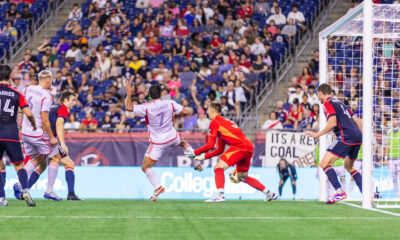
 Orlando City2 weeks ago
Orlando City2 weeks agoOrlando City vs. New England Revolution: Final Score 3-1 as Lions Finally Win at Gillette Stadium
-
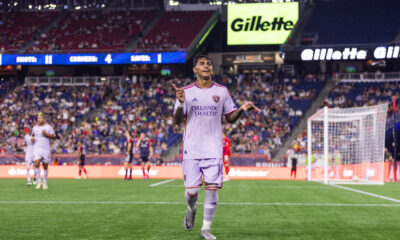
 Orlando City2 weeks ago
Orlando City2 weeks agoOrlando City vs. New England Revolution: Player Grades and Man of the Match
-
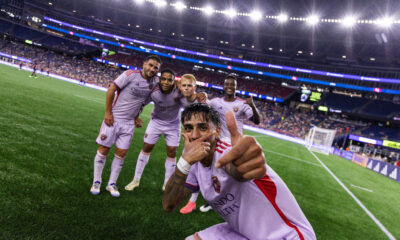
 Orlando City2 weeks ago
Orlando City2 weeks agoOrlando City vs. New England Revolution: Five Takeaways
-
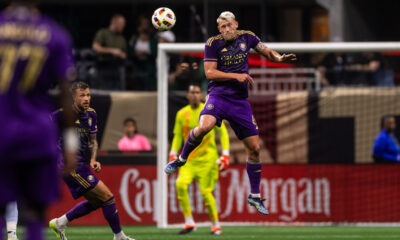
 Orlando City2 weeks ago
Orlando City2 weeks agoHow Should We Make Sense of Orlando City’s Defense in 2024?
-
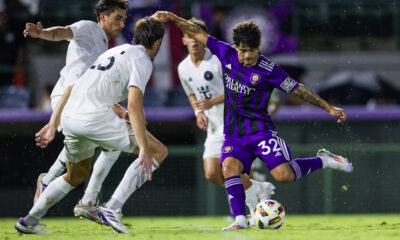
 Orlando City B2 weeks ago
Orlando City B2 weeks agoOrlando City B vs. Inter Miami II: Final Score 1-1 as OCB Draws Rivals and Claims a Second Point in Penalties
-
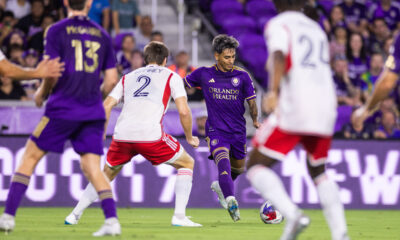
 Orlando City2 weeks ago
Orlando City2 weeks agoIntelligence Report: Orlando City vs. New England Revolution
-
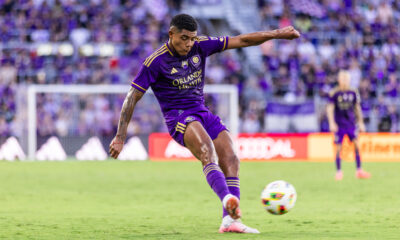
 Podcasts2 weeks ago
Podcasts2 weeks agoPawedCast Episode 432: New England Preview, OCB Set to Host Inter Miami II, and More
-
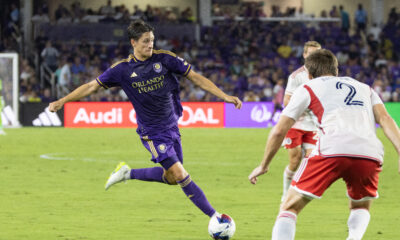
 Orlando City2 weeks ago
Orlando City2 weeks agoOrlando City at New England Revolution: Three Keys to Victory


